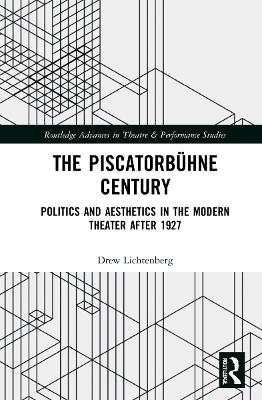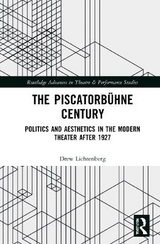The Piscatorbühne Century
Politics and Aesthetics in the Modern Theater After 1927
Seiten
This study of the Piscatorbühne season of 1927-8 uncovers a vital, previously neglected current of radical experiment in modern theater, a ghost in the machine of contemporary performance practices.
This study of the Piscatorbühne season of 1927–1928 uncovers a vital, previously neglected current of radical experiment in modern theater, a ghost in the machine of contemporary performance practices.
A handful of theater seasons changed the course of 20th- and 21st-century theatre. But only the Piscatorbühne of 1927–1928 went bankrupt in less than a year. This exploration tells the story of that collapse, how it predicted the wider collapse of the late Weimar Republic, and how it relates to our own era of political polarization and economic instability. As a wider examination of Piscator’s contributions to dramaturgical and aesthetic form, The Piscatorbühne Century makes a powerful and timely case for the renewed significance of the broader epic theater tradition. Drawing on a rich archive of interwar materials, Drew Lichtenberg reconstructs this germinal nexus of theory and praxis for the modern theatre.
This book will be of great interest to students and scholars in theatre, performance, art, and literature.
This study of the Piscatorbühne season of 1927–1928 uncovers a vital, previously neglected current of radical experiment in modern theater, a ghost in the machine of contemporary performance practices.
A handful of theater seasons changed the course of 20th- and 21st-century theatre. But only the Piscatorbühne of 1927–1928 went bankrupt in less than a year. This exploration tells the story of that collapse, how it predicted the wider collapse of the late Weimar Republic, and how it relates to our own era of political polarization and economic instability. As a wider examination of Piscator’s contributions to dramaturgical and aesthetic form, The Piscatorbühne Century makes a powerful and timely case for the renewed significance of the broader epic theater tradition. Drawing on a rich archive of interwar materials, Drew Lichtenberg reconstructs this germinal nexus of theory and praxis for the modern theatre.
This book will be of great interest to students and scholars in theatre, performance, art, and literature.
Drew Lichtenberg is a writer, teacher, and dramaturg who lives in Washington, DC. His work has appeared in theaters and publications on both sides of the Atlantic. He received his MFA and DFA in Dramaturgy and Dramatic Criticism from Yale School of Drama.
Introduction; 1. The Founding and Principles of the Piscatorbühne; 2. Piscator in Context; 3. Piscatorbühne 1927–1928; 4. Brecht and Piscator: Dialectical Affinities; 5. The Piscator Lines of the Modern Theater
| Erscheinungsdatum | 23.11.2021 |
|---|---|
| Reihe/Serie | Routledge Advances in Theatre & Performance Studies |
| Zusatzinfo | 29 Halftones, black and white; 29 Illustrations, black and white |
| Verlagsort | London |
| Sprache | englisch |
| Maße | 156 x 234 mm |
| Gewicht | 453 g |
| Themenwelt | Kunst / Musik / Theater ► Theater / Ballett |
| Geisteswissenschaften ► Sprach- / Literaturwissenschaft ► Anglistik / Amerikanistik | |
| Geisteswissenschaften ► Sprach- / Literaturwissenschaft ► Literaturwissenschaft | |
| Sozialwissenschaften ► Kommunikation / Medien ► Medienwissenschaft | |
| ISBN-10 | 0-367-75766-4 / 0367757664 |
| ISBN-13 | 978-0-367-75766-3 / 9780367757663 |
| Zustand | Neuware |
| Haben Sie eine Frage zum Produkt? |
Mehr entdecken
aus dem Bereich
aus dem Bereich
Poetik eines sozialen Urteils
Buch | Hardcover (2023)
De Gruyter (Verlag)
59,95 €
Buch | Softcover (2024)
belleville (Verlag)
20,00 €




